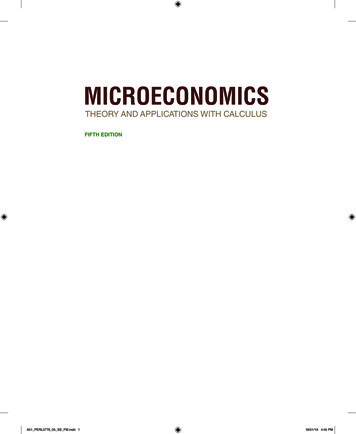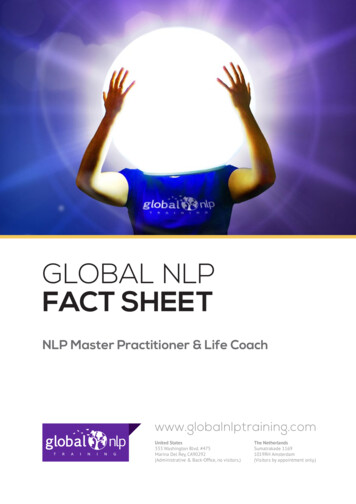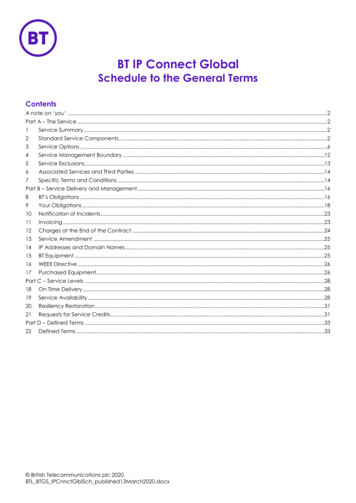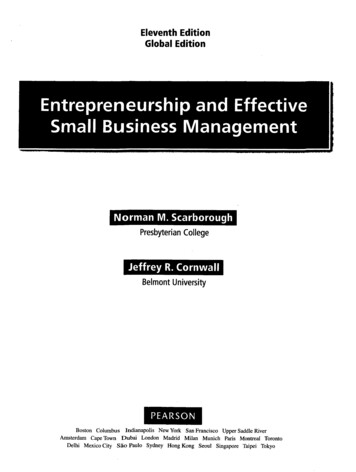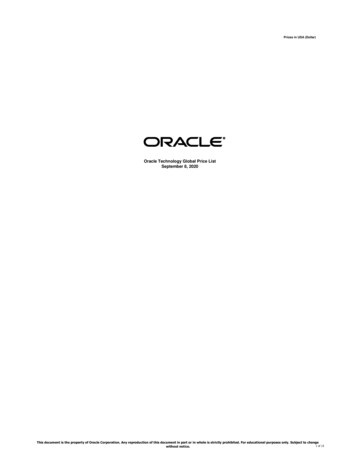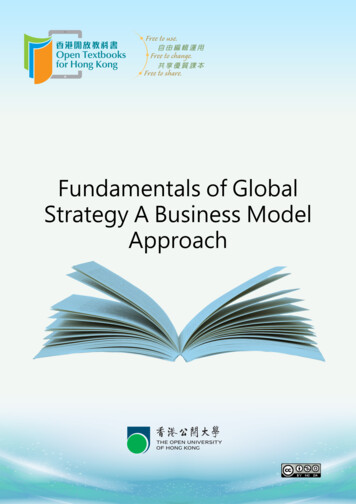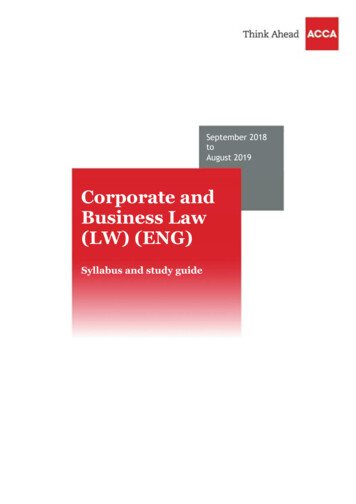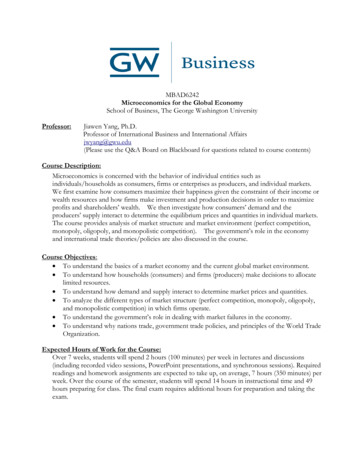
Transcription
MBAD6242Microeconomics for the Global EconomySchool of Business, The George Washington UniversityProfessor:Jiawen Yang, Ph.D.Professor of International Business and International Affairsjwyang@gwu.edu(Please use the Q&A Board on Blackboard for questions related to course contents)Course Description:Microeconomics is concerned with the behavior of individual entities such asindividuals/households as consumers, firms or enterprises as producers, and individual markets.We first examine how consumers maximize their happiness given the constraint of their income orwealth resources and how firms make investment and production decisions in order to maximizeprofits and shareholders’ wealth. We then investigate how consumers’ demand and theproducers’ supply interact to determine the equilibrium prices and quantities in individual markets.The course provides analysis of market structure and market environment (perfect competition,monopoly, oligopoly, and monopolistic competition). The government’s role in the economyand international trade theories/policies are also discussed in the course.Course Objectives: To understand the basics of a market economy and the current global market environment. To understand how households (consumers) and firms (producers) make decisions to allocatelimited resources. To understand how demand and supply interact to determine market prices and quantities. To analyze the different types of market structure (perfect competition, monopoly, oligopoly,and monopolistic competition) in which firms operate. To understand the government’s role in dealing with market failures in the economy. To understand why nations trade, government trade policies, and principles of the World TradeOrganization.Expected Hours of Work for the Course:Over 7 weeks, students will spend 2 hours (100 minutes) per week in lectures and discussions(including recorded video sessions, PowerPoint presentations, and synchronous sessions). Requiredreadings and homework assignments are expected to take up, on average, 7 hours (350 minutes) perweek. Over the course of the semester, students will spend 14 hours in instructional time and 49hours preparing for class. The final exam requires additional hours for preparation and taking theexam.
MBAD6242 Microeconomics for the Global EconomyProfessor Jiawen YangSpring 2020Required Readings:Teaching (Lecture) notes and PowerPoint presentations (PPT) (posted on Blackboard):These are the primary reading for the course. They summarize the contents from the textbook andother related material, and help course participants remain focused on key concepts of the subjects.Required text: Samuelson and Nordhaus. Economics, 19th edition. McGraw-Hill/Irwin, 2010.ISBN 978-0-07-351129-0; MHID 0-07-351129-3. (An earlier edition of the text is fine, but you have to findthe corresponding chapters for the required readings.)Other materials: Selected articles from academic and business journals and other publicationsmay be added to the readings as the course is in session. Students are encouraged to follow realworld economic developments by reading one or more major economic and business journals on aregular basis.See required readings for each specific class session in “Session Outlines and ReadingAssignments” of this syllabus.Recommended Supplementary Readings:Perloff, Jeffrey M. Microeconomics, 8th edition. Pearson, 2018. Print ISBN: 9780134519531,0134519531; eText ISBN: 9780134543857, 0134543858. This textbook provides more quantitativeanalysis of the subjects covered in the course. Though not required, students are encouraged toread selected parts of the text for more in-depth and advanced learning of certain subjects.Akerlof, George A. and Robert J. Shiller. Phishing for Phools: The Economics of Manipulation andDeception. Princeton University Press. Paperback, 2016, ISBN: 9780691173023; Hardcover, 2015,ISBN: 9780691168319. This book strikes a radically new direction in economics and offers a muchmore general account of why free markets and competition cause serious problems.There are other supplementary readings listed for some sessions. Supplementary readings are notincluded in homework assignments or the final exam unless they are referred in the teaching notes.Requirements, Assignments, Tests, and Grading Policies:This course requires basic math skills in arithmetic, algebra, and geometry, as well as an ability tomanipulate data, read graphs, and pay attention to details.Students’ performance in the course is evaluated as follows:Homework assignments60 pointsFinal exam40 pointsTotal100 pointsBlackboard: The entire course is conducted through Blackboard. Students are required to getfamiliar with the course setup and expected to access Blackboard on a regular basis while the courseis in session for updates of course materials, announcements, and other course related information.Specific schedules and due times of the assignments and the final exam are posted separately onBlackboard (See “Syllabus/Schedules” on Blackboard). Students are required to strictly followthe schedules and the due dates for the assignments and the final exam. It is highly recommended2
MBAD6242 Microeconomics for the Global EconomyProfessor Jiawen YangSpring 2020that students plan to complete assignments and the exam ahead of the due time to avoid late houremergencies and computer/internet breakdowns.Homework assignments: There will be seven homework assignments corresponding to therespective class sessions. You are required to complete these assignments on Blackboard (see“Homework Assignments” folder). No other form of submission is accepted. You may take oneor two attempts for each assignment. If two attempts are taken, the score for the assignment willbe the average of these two attempts.Students are required to submit homework assignments on Blackboard by the designateddeadlines. No late submission or makeup is accepted. Answers to the homework assignments aremade available on Blackboard upon the respective deadlines. Six of the seven assignments willcount toward the final course grade. That is, if you miss one assignment, your score for thatassignment (virtually zero) is dropped without affecting your course grade. If you complete all theassignments, the assignment with the lowest score is automatically dropped. The resulting sixassignments will have an equal weight of 10 points each.Final exam: The final exam covers materials contained in the teaching notes, PowerPointpresentations, homework assignments (and answers), the required text, live-session presentations,and other required readings. The final exam covers the entire course. The exam is open-book.However, there is a time limit for completion and only one attempt is allowed for the exam. Latesubmission is subject to a one-time penalty of 25% of the exam grade. Students are recommendedto prepare notes (cheat sheet) for the exam. Such notes may help organize your thoughts, identifyweaknesses in your preparation, and strengthen your understanding of the key concepts. Makeupfor the exam is not allowed except for health and family emergencies.Live (Sync) Sessions. There will be collaborative or synchronous sessions for the course (seeschedules in the “Live Sessions” folder). Such sessions provide an opportunity for discussions andanalyses of current events in the world economy, and for questions and interaction among studentsand with the professor. Students are required to attend one of these sessions each week for the firstfive weeks. If you miss a session, make sure you attend another session in the same week or reviewthe recorded session to make it up. Contents in the live-session presentations are included in thehomework assignments and/or the final exam.The Q&A/Discussion board. Students are encouraged to post their course content-relatedquestions to this board instead of sending emails to the professor. Answers will be provided on thesame board. Questions through emails may be posted and answered on this board as well so thatwe learn from each other’s questions. Before sending emails for questions, students arerecommended to visit this board to see if the same or similar questions have already been raised andanswered.Real World Readings. This Blackboard section provides links to media coverage of course-relatedreal world events and other references. Visit to this section is voluntary. However, you areencouraged to browse these links and relate what we learn in the course to what is going on in thereal world. The folders may include references to past events as well as to current events. Contentsin this folder are not tested in the homework assignments or exams unless they are included in therequired course material.3
MBAD6242 Microeconomics for the Global EconomyProfessor Jiawen YangSpring 2020Academic Integrity and University PoliciesAcademic Integrity:The code of academic integrity applies to all courses in the George Washington School ofBusiness. Please become familiar with the code. All students are expected to maintain the highestlevel of academic integrity throughout the course of the semester. Please note that acts ofacademic dishonesty during the course will be prosecuted and harsh penalties may be sought forsuch acts. Students are responsible for knowing what acts constitute academic dishonesty. Thecode may be found at: http://www.gwu.edu/ ntegrity/code.html.Religious Accommodation:Students should notify faculty during the first week of the semester of their intention to be absentfrom class on their day(s) of religious observance.Faculty should extend to these students the courtesy of absence without penalty on suchoccasions, including permission to make up examinations. Faculty who intend to observe areligious holiday should arrange at the beginning of the semester to reschedule missed classes orto make other provisions for their course-related activities.Disability Support Services (DSS) 202-994-8250:Any student who may need an accommodation based on the potential impact of a disabilityshould contact the Disability Support Services office at 202-994-8250 in the Rome Hall, Suite 102,to establish eligibility and to coordinate reasonable accommodations. For additional informationplease refer to: https://disabilitysupport.gwu.edu/.Counseling and Psychological Services 202-994-5300:The University's Mental Health Services offers 24/7 assistance and referral to address students'personal, social, career, and study skills problems. Services for students include: crisis andemergency mental health consultations confidential assessment, counseling services (individualand small group), and referrals. logicalservices.4
MBAD6242 Microeconomics for the Global EconomyProfessor Jiawen YangSpring 2020Session Outlines and Reading AssignmentsSession 1Introduction; Supply and DemandTopics:Central concepts of economicsMajor problems that an economy has to solveThe “invisible hand”Alternative economic systems in the worldInputs, outputs, technology, and production possibility frontier (PPF)Specialization and exchangeBasic elements of supply and demandRequired readings:Lecture noteSamuelson and Nordhaus, 2010:Chapter 1: The Central Concepts of EconomicsAppendix 1: How to Read GraphsChapter 2: The Modern Mixed EconomyChapter 3: Basic Elements of Supply and DemandSupplementary readings:Perloff, 2018:Chapter 1: IntroductionChapter 2: Supply and DemandSession 2 Demand and Consumer BehaviorTopics:Utility and marginal utilityThe law of diminishing marginal utilityPrice elasticity of demand and calculationIncome effect and substitution effectConsumer surplus and calculationIndifference curves and indifference mapsConsumer equilibrium with indifference curve and budget constraintRequired readings:Lecture noteSamuelson and Nordhaus, 2010:Chapter 4: Supply and Demand: Elasticity and ApplicationChapter 5: Demand and Consumer BehaviorAppendix 5: Geometrical Analysis of Consumer EquilibriumSupplementary readings:Perloff, 2018:Chapter 3: Applying the Supply-and-Demand ModelChapter 4: Consumer ChoiceChapter 5: Applying Consumer Theory5
MBAD6242 Microeconomics for the Global EconomyProfessor Jiawen YangSpring 2020Session 3 Firm Theory: Production and CostsTopics:The theory of production and marginal productsProduction functions, total product, marginal product, average productThe law of diminishing returnsReturns to scaleCosts: Total cost, fixed cost, variable costAverage total cost, average fixed cost, average variable costMarginal costRequired readings:Lecture noteSamuelson and Nordhaus, 2010:Chapter 6: Production and Business OrganizationChapter 7: Analysis of CostsSupplementary readings:Perloff, 2018:Chapter 6: Firms and ProductionChapter 7: CostsSession 4 Perfect CompetitionTopics:Firm behavior in a perfectly competitive marketProfit maximization in a perfectly competitive marketThe break-even and shutdown conditions for a perfectly competitive firmEconomic profitThe supply curve of a competitive firm and the marginal cost curveProducer surplusMarket equilibrium with supply and demandThe efficiency of perfect competitionRequired readings:Lecture noteSamuelson and Nordhaus, 2010:Chapter 8: Analysis of Perfectly Competitive MarketsSupplementary readings:Perloff, 2018:Chapter 8: Competitive Firms and MarketsChapter 9: Applying the Competitive Model6
MBAD6242 Microeconomics for the Global EconomyProfessor Jiawen YangSpring 2020Session 5 Imperfect CompetitionTopics:Market structures: Definitions and classificationsMonopoly profit maximizationMarket structures and market powerCollusive oligopolyMonopolistic competitionOligopoly and game theoryPrice discriminationRequired readings:Lecture noteSamuelson and Nordhaus, 2010:Chapter 9: Imperfect Competition and MonopolyChapter 10: Competition among the FewSupplementary readings:Perloff, 2018:Chapter 11: MonopolyChapter 12: Pricing and AdvertisingChapter 13: Oligopoly and Monopolistic C
Perloff, Jeffrey M. Microeconomics, 8th edition. Pearson, 2018. Print ISBN: 9780134519531, 0134519531; eText ISBN: 9780134543857, 0134543858. This textbook provides more quantitative analysis of the subjects covered in the course. Though not required, students are encouraged to read selected parts of the text for more in-depth and advanced learning of certain subjects. Akerlof, George


